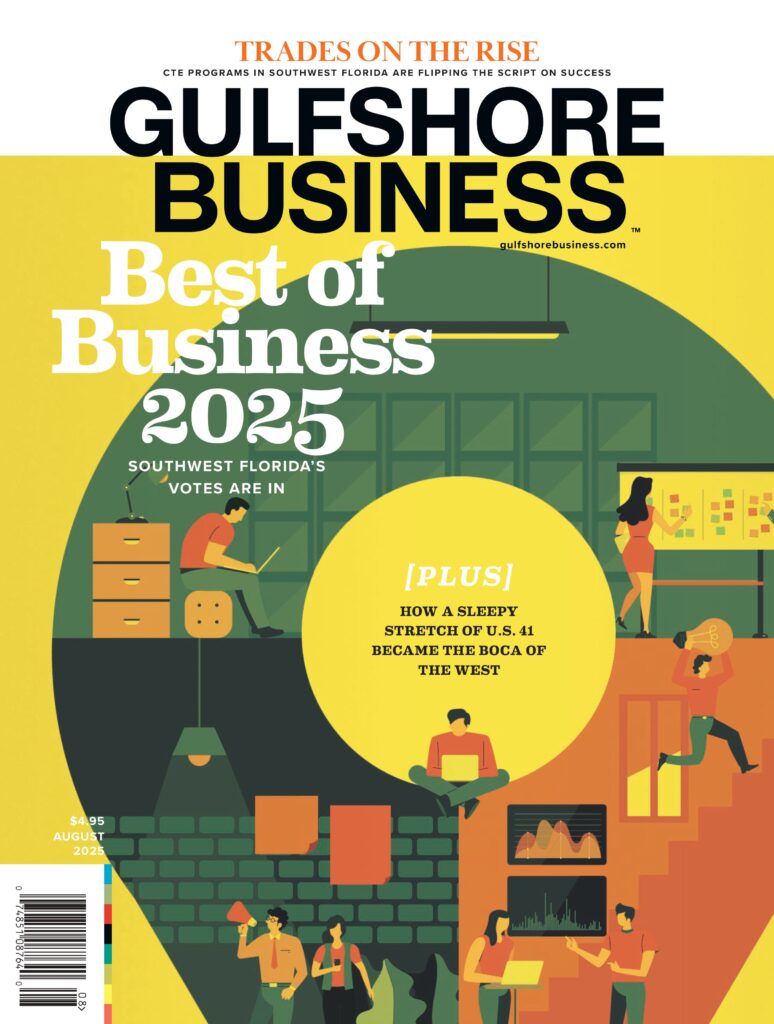If Judy Jetson were enrolled at Florida Gulf Coast University this summer, she would feel right at home when her on-campus lunch order was delivered by a tidy little robot.
The fictional teen from the cult classic 1960s cartoon series “The Jetsons,” which was set in 2062, when flying cars and multitasking robots were the norm, would certainly recognize the concept of seeing what looks like a dorm refrigerator on wheels zipping around campus delivering food.
Ten dining delivery Starship Technologies robots are being tested on campus during summer sessions in an initiative led by FGCU Student Government.
Students, faculty and others can order food via the Grubhub app from one of three on-campus locations — Einstein Bros Bagels, Dunkin’ and the new SG Market —and have it delivered by a Starship robot to residence halls, the library and other academic buildings. The robots operate during the same hours as the dining locations they serve.
 After the summer trial, plans call for 20 more robots to be activated when the fall semester starts, with 12 more participating on-campus food options.
After the summer trial, plans call for 20 more robots to be activated when the fall semester starts, with 12 more participating on-campus food options.
Student Body President Gianna Ihuoma, a rising junior from Missouri with a dual major in business management and political science, said the new food delivery option will “elevate the student experience” by adding a convenience and timesaving factor.
“I think, overall, it will elevate the student experience by just helping with accessibility,” Ihuoma said during a June 24 media event unveiling the robots. “If you’re studying in the library or something like that, you don’t have to take a whole chunk of your study time to go and get a snack. You can just have it come to you.”
Student leadership identified food service gaps
Ihuoma and Student Body Vice President Giovanna DeMarco, a rising sophomore from Ohio majoring in legal studies, said they were executing the launch of the initiative after it was started by their student government predecessors, Ryan Kaczynski and Jackson Chumbley.
“They saw a gap where they thought people who live on campus need the opportunity to have food delivered to them if they so choose, so they decided to bring this idea to life and we will continue the process through our [2025-26] administration,” Ihuoma said.
“They started it during their term, bringing it to life, and we continued carrying forward their initiative,” DeMarco said. “Obviously, they did a great job in setting it up and it’s going to be really good for our student body. We’re super excited to keep it going.”
DeMarco said she thinks it’s an asset for FGCU to offer the high-tech dining delivery option since many larger universities make it available to their students.
 “Most of the Big Ten [Conference] schools have these on campus, so to have the same kind of technology on campus for our students is really nice,” she said.
“Most of the Big Ten [Conference] schools have these on campus, so to have the same kind of technology on campus for our students is really nice,” she said.
Ihuoma agreed, saying she thinks initiatives like this one help FGCU stay competitive.
“We’re staying up to date with all the new trends in technology and I think this is just one more way we do that,” Ihuoma said.
She said the standard fee for the robotic delivery service will be free for the first year, fully funded by Student Government through collected student activity and service fees.
In total, Student Government contributed approximately $185,000 toward the project.
FGCU said Student Government is partnering with the dining services division to develop flyers and other promotional materials to help inform and engage the student body.
Robots can stand up to SWFL weather
San Francisco-based Starship Technologies, founded in 2014, currently has the autonomous delivery robots on more than 60 campuses across the U.S., according to Bob Mumper, the company’s director of field operations.
Mumper said the robots, which weigh about 45 pounds and can carry about 20 pounds at a time over short distances, have done more than 8 million deliveries worldwide, driving more than 10 million miles. The robots are fully electric, with zero emissions, according to the company.
Asked how the robots will bear up during Southwest Florida’s rainy season, Mumper said the robots — which use GPS, cameras, ultrasonic sensors, radar and artificial intelligence to navigate — are built to withstand all sorts of weather conditions.
 “For the Florida thunderstorms that roll through, we’re ready for those,” Mumper said. “We’ve been operating through the rain and snow for over 10 years, and every day we cross about 125,000 roadways safely.”
“For the Florida thunderstorms that roll through, we’re ready for those,” Mumper said. “We’ve been operating through the rain and snow for over 10 years, and every day we cross about 125,000 roadways safely.”
He said the robots typically move at about 4 mph and will primarily navigate on FGCU campus sidewalks. He said deliveries can be made within 20-30 minutes on average, and the robots can do “quite a few” per hour.
FGCU said Starship has hired five students as field associates with the program and one full-time robot maintenance staffer, primarily through the university’s engineering department.
As for the potential dangers of theft and vandalism, FGCU materials said the robots have “many theft prevention measures,” including alarms if they are picked up or moved that can track to the nearest inch, a securely locked lid and cameras that can record.





